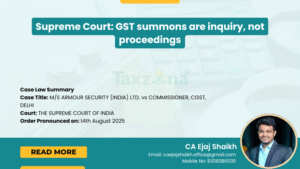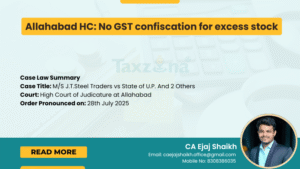Dear Member,
As we all are that the refund of unutilized Input tax credit of inverted duty (hereinafter referred to as the “ITC”) under GST is dealt under Section 54(3) (ii).
In terms of Section 54(3) of Central Goods and Service Tax (hereinafter referred to as the “CGST Act, 2017”) refund of unutilized input tax credit shall be allowed only in two cases as mentioned below;
- ……………………………..
- In case of Inverted duty structure i.e where GST rate of tax on Inputs being higher than the GST rate on output supplies.
However, Rule 89(5) of the Central Goods and Service Tax Rules,2017 (hereinafter referred to as the “CGST Rules, 2017”) is enacted to provide formula for determining the refund on account of inverted duty structure and a registered taxable person is entitled to refund of the unutilized input tax credit availed during the relevant period.
The provision of Rule 89(5) of the CGST Rules, 2017 as originally introduced was substituted vide Notification No. 21 /2018-CT dated 18.4.2018 prescribed a revised formula for determining the refund on account of inverted duty structure which was given retrospective effect from 1.7.2017 vide Notification No. 26/2018-CT dated 13.6.2018. The revised formula inter alia excluded input services from the scope of ‘net input tax credit’ for computation of the refund amount under the Rule.
Though, the Division bench of Hon’ble High court of Gujarat in M/s VKC Footsteps India Pvt. Ltd. v. Union of India dated 24.07.2020 held that;
“Explanation (a) to Rule 89(5) which denies the refund of “unutilized input tax” paid on “input services” as part of “input tax credit” accumulated on account of inverted duty structure is ultra vires the provision of Section 54(3) of the CGST Act, 2017.”
The High Court therefore directed the Union Government to allow the claim for refund made by the petitioners before it, considering unutilized ITC on input services as part of “Net ITC” for the purpose of calculating refund in terms of Rule 89(5), in furtherance of Section 54(3)
On the other hand, in a similar case the Division Bench of the Madras High Court passed a contrary judgment in M/s Tvl. Transtonnelstroy Afcons Joint Venture v. Union of India. The Madras High Court has concluded that;
“63…
(1) Section 54(3)(ii) does not infringe Article 14. (2) Refund is a statutory right and the extension of the benefit of refund only to the unutilized credit that accumulates on account of the rate of tax on input goods being higher than the rate of tax on output supplies by excluding unutilized input tax credit that accumulated on account of input services is a valid classification and a valid exercise of legislative power.”
The writ petitions challenging the validity of Rule 89(5) on the ground that it is ultra vires Section 54(3)(ii) were dismissed.
Thereafter, SLP(C) filed before the Hon’ble Supreme Court of India by the Union of India against the order passed by the Hon’ble Gujarat High Court in M/s VKC Footsteps v. Union of India, 2020 and filed by Assessees against the Hon’ble Madras High Court judgement in M/s TVL. Transtonnelstroy Afcons Joint Venture V. Union of India, 2020,
Now, the Hon’ble Supreme Court of India vide Civil Appeal No. 4810/2021 dated 13.10.2021 affirmed the view of Division bench of Hon’ble Madras High Court and disapproved the view of the Hon’ble Gujarat High Court.
The Hon’ble Supreme Court of India held that;
- The appeals 55 filed by the Union of India against the judgment of the Gujarat High Court dated 4 July 2020 in VKC Footsteps India Pvt. Ltd. (supra) and connected cases are allowed and the judgment shall be set aside;
- The appeals 56 filed by the assessees against the judgment of the Madras High Court in Tvl. Transtonnelstroy Afcons Joint Venture (supra) and connected cases dated 21 September 2020 shall stand dismissed. As a consequence, the writ petition filed by the assessees shall also stand dismissed
The observations in paragraphs 104 to 111 shall be considered by the GST Council to enable it to take a considered view in accordance with law.




